 Beneath the Surface
Beneath the Surface Dark Currents
Dark Currents The Dragon Blood Collection, Books 1-3
The Dragon Blood Collection, Books 1-3![Hunted [The Flash Gold Chronicles] Read online](//i1.bookreadfree.com/16/hunted_[the_flash_gold_chronicles]_preview.jpg) Hunted [The Flash Gold Chronicles]
Hunted [The Flash Gold Chronicles]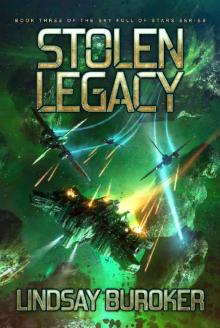 Stolen Legacy
Stolen Legacy Snake Heart
Snake Heart Shattered Past
Shattered Past Star Nomad
Star Nomad Patterns in the Dark
Patterns in the Dark Torrent
Torrent The Rogue Prince
The Rogue Prince Forged in Blood II
Forged in Blood II Liberty
Liberty The Fowl Proposal Bonus Scenes
The Fowl Proposal Bonus Scenes Forged in Blood I
Forged in Blood I Soulblade
Soulblade Perilous Hunt
Perilous Hunt 05 Dragon Blood: The Blade's Memory
05 Dragon Blood: The Blade's Memory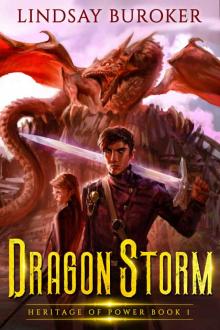 Dragon Storm
Dragon Storm The Goblin Brothers Adventures
The Goblin Brothers Adventures Republic
Republic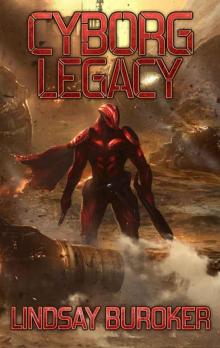 Cyborg Legacy
Cyborg Legacy Origins
Origins Beginnings: Five Heroic Fantasy Adventure Novels
Beginnings: Five Heroic Fantasy Adventure Novels Warrior Mage
Warrior Mage Swords and Salt - the Complete Series
Swords and Salt - the Complete Series 6.0 - Raptor
6.0 - Raptor Destiny Unchosen
Destiny Unchosen Balanced on the Blade's Edge
Balanced on the Blade's Edge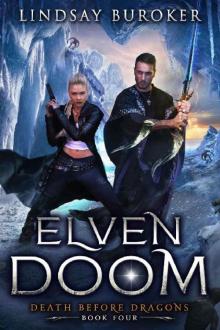 Elven Doom (Death Before Dragons Book 4)
Elven Doom (Death Before Dragons Book 4)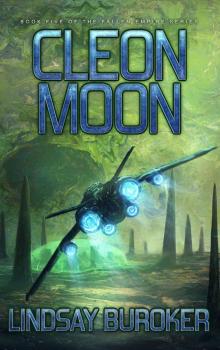 Cleon Moon
Cleon Moon Oaths (Dragon Blood, Book 8)
Oaths (Dragon Blood, Book 8) Crossfire (Star Kingdom Book 4)
Crossfire (Star Kingdom Book 4) Dragon Tear (Agents of the Crown Book 5)
Dragon Tear (Agents of the Crown Book 5) Encrypted
Encrypted Flash Gold
Flash Gold Enigma
Enigma_preview.jpg) Shadows Over Innocence (an Emperor's Edge short story)
Shadows Over Innocence (an Emperor's Edge short story) Decrypted
Decrypted Mist and Magic
Mist and Magic Starseers
Starseers Relic of Sorrows
Relic of Sorrows Blood and Betrayal
Blood and Betrayal Diplomats and Fugitives
Diplomats and Fugitives_preview.jpg) Balanced on the Blade's Edge (Dragon Blood, Book 1)
Balanced on the Blade's Edge (Dragon Blood, Book 1) The Emperor's Edge, no. 1
The Emperor's Edge, no. 1 Gold Dragon
Gold Dragon Duty Bound
Duty Bound Secrets of the Sword 2 (Death Before Dragons Book 8)
Secrets of the Sword 2 (Death Before Dragons Book 8) Peacemaker
Peacemaker Short Stories from the Star Kingdom
Short Stories from the Star Kingdom Shockwave
Shockwave Degrees of Delusion
Degrees of Delusion Assassin's Bond (Chains of Honor, Book 3)
Assassin's Bond (Chains of Honor, Book 3)_preview.jpg) The Emperor's Edge (a high fantasy mystery in an era of steam)
The Emperor's Edge (a high fantasy mystery in an era of steam)_preview.jpg) Solstice Day Gifts (an Emperor's Edge Short Story)
Solstice Day Gifts (an Emperor's Edge Short Story) Fractured Stars
Fractured Stars Honor's Flight
Honor's Flight Eye of Truth
Eye of Truth Arkadian Skies
Arkadian Skies Ship of Ruin
Ship of Ruin Unraveled
Unraveled Blood Ties
Blood Ties Great Chief
Great Chief End Game
End Game Conspiracy
Conspiracy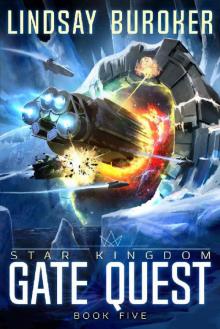 Gate Quest (Star Kingdom Book 5)
Gate Quest (Star Kingdom Book 5) Claimed
Claimed Under the Ice Blades
Under the Ice Blades Hero Code
Hero Code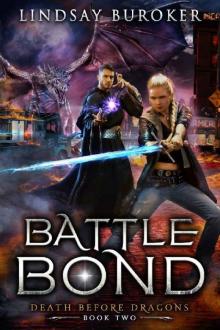 Battle Bond: An Urban Fantasy Dragon Series (Death Before Dragons Book 2)
Battle Bond: An Urban Fantasy Dragon Series (Death Before Dragons Book 2) Blood Charged
Blood Charged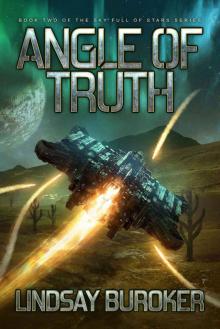 Angle of Truth
Angle of Truth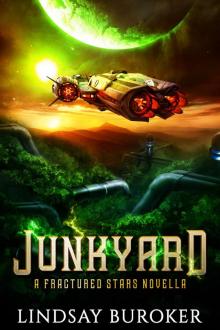 Junkyard
Junkyard Agents of the Crown- The Complete Series
Agents of the Crown- The Complete Series Planet Killer (Star Kingdom Book 6)
Planet Killer (Star Kingdom Book 6) Shadows Over Innocence
Shadows Over Innocence Forged in Blood I ee-6
Forged in Blood I ee-6 Sinister Magic: An Urban Fantasy Dragon Series (Death Before Dragons Book 1)
Sinister Magic: An Urban Fantasy Dragon Series (Death Before Dragons Book 1) Blood and Betrayal (The Emperor's Edge Book 5)
Blood and Betrayal (The Emperor's Edge Book 5) Smuggler Ship
Smuggler Ship The Rogue Prince (Sky Full of Stars, Book 1)
The Rogue Prince (Sky Full of Stars, Book 1)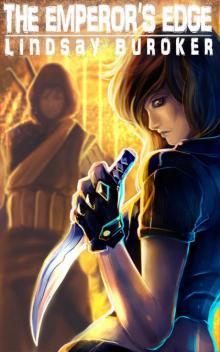 The Emperor's Edge (a high fantasy adventure in an era of steam)
The Emperor's Edge (a high fantasy adventure in an era of steam) Great Chief (Chains of Honor, Book 4)
Great Chief (Chains of Honor, Book 4) Hunted fgc-2
Hunted fgc-2 Shadows Over Innocence (emperor's edge)
Shadows Over Innocence (emperor's edge)![[Fallen Empire 00.5 - 03.0] Star Nomad Honor's Flight Starfall Station Starseers Last Command Read online](//i1.bookreadfree.com/i/03/22/fallen_empire_00_5_-_03_0_star_nomad_hon_starfall_station_starseers_last_command_preview.jpg) [Fallen Empire 00.5 - 03.0] Star Nomad Honor's Flight Starfall Station Starseers Last Command
[Fallen Empire 00.5 - 03.0] Star Nomad Honor's Flight Starfall Station Starseers Last Command Arkadian Skies: Fallen Empire, Book 6
Arkadian Skies: Fallen Empire, Book 6 Enigma (emperor's edge)
Enigma (emperor's edge) Diplomats and Fugitives (The Emperor's Edge Book 9)
Diplomats and Fugitives (The Emperor's Edge Book 9)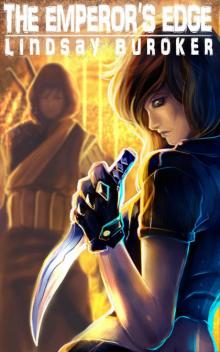 The Emperor's edge tee-1
The Emperor's edge tee-1 Liberty (Flash Gold, #5)
Liberty (Flash Gold, #5) Starseers: Fallen Empire, Book 3
Starseers: Fallen Empire, Book 3 Peacemaker fgc-3
Peacemaker fgc-3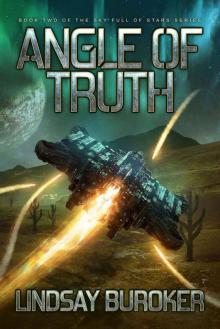 Angle of Truth (Sky Full of Stars, Book 2)
Angle of Truth (Sky Full of Stars, Book 2) Perilous Hunt: Fallen Empire, Book 7
Perilous Hunt: Fallen Empire, Book 7 Ice Cracker II (emperor's edge)
Ice Cracker II (emperor's edge) Conspiracy (The Emperor's Edge Book 4)
Conspiracy (The Emperor's Edge Book 4) Decrypted (Encrypted #2)
Decrypted (Encrypted #2) Forgotten Ages (The Complete Series)
Forgotten Ages (The Complete Series)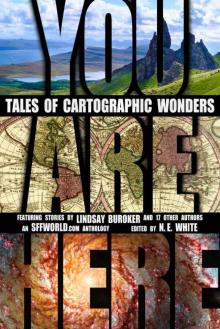 You Are Here: Tales of Cartographic Wonders
You Are Here: Tales of Cartographic Wonders Duty Bound (Agents of the Crown Book 3)
Duty Bound (Agents of the Crown Book 3) Snake Heart (Chains of Honor Book 2)
Snake Heart (Chains of Honor Book 2) Conspiracy ee-4
Conspiracy ee-4 Flash Gold fgc-1
Flash Gold fgc-1 Fallen Empire 1: Star Nomad
Fallen Empire 1: Star Nomad Claimed (The Flash Gold Chronicles, #4)
Claimed (The Flash Gold Chronicles, #4) Ice Cracker II (and other short stories) (The Emperor's Edge)
Ice Cracker II (and other short stories) (The Emperor's Edge) Fallen Empire 2: Honor's Flight
Fallen Empire 2: Honor's Flight Gold Dragon (Heritage of Power Book 5)
Gold Dragon (Heritage of Power Book 5) Encrypted (the emperor's edge)
Encrypted (the emperor's edge) Peacemaker (The Flash Gold Chronicles, #3)
Peacemaker (The Flash Gold Chronicles, #3) Patterns in the Dark (Dragon Blood Book 4)
Patterns in the Dark (Dragon Blood Book 4)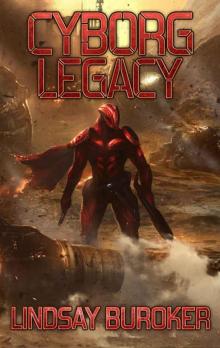 Cyborg Legacy: A Fallen Empire Novel
Cyborg Legacy: A Fallen Empire Novel The Swords & Salt Collection
The Swords & Salt Collection Blood and Betrayal ee-5
Blood and Betrayal ee-5 The assassin curse
The assassin curse Warrior Mage (Book 1)
Warrior Mage (Book 1) Forged in Blood II ee-7
Forged in Blood II ee-7 Relic of Sorrows: Fallen Empire, Book 4
Relic of Sorrows: Fallen Empire, Book 4 Deadly Games ee-3
Deadly Games ee-3 Elven Fury (Agents of the Crown Book 4)
Elven Fury (Agents of the Crown Book 4) Torrent rar-1
Torrent rar-1 Beneath the Surface
Beneath the Surface Dark Currents
Dark Currents The Dragon Blood Collection, Books 1-3
The Dragon Blood Collection, Books 1-3![Hunted [The Flash Gold Chronicles] Read online](http://i1.bookreadfree.com/16/hunted_[the_flash_gold_chronicles]_preview.jpg) Hunted [The Flash Gold Chronicles]
Hunted [The Flash Gold Chronicles] Stolen Legacy
Stolen Legacy Snake Heart
Snake Heart Shattered Past
Shattered Past Star Nomad
Star Nomad Patterns in the Dark
Patterns in the Dark Torrent
Torrent The Rogue Prince
The Rogue Prince Forged in Blood II
Forged in Blood II Liberty
Liberty The Fowl Proposal Bonus Scenes
The Fowl Proposal Bonus Scenes Forged in Blood I
Forged in Blood I Soulblade
Soulblade Perilous Hunt
Perilous Hunt 05 Dragon Blood: The Blade's Memory
05 Dragon Blood: The Blade's Memory Dragon Storm
Dragon Storm The Goblin Brothers Adventures
The Goblin Brothers Adventures Republic
Republic Cyborg Legacy
Cyborg Legacy Origins
Origins Beginnings: Five Heroic Fantasy Adventure Novels
Beginnings: Five Heroic Fantasy Adventure Novels Warrior Mage
Warrior Mage Swords and Salt - the Complete Series
Swords and Salt - the Complete Series 6.0 - Raptor
6.0 - Raptor Destiny Unchosen
Destiny Unchosen Balanced on the Blade's Edge
Balanced on the Blade's Edge Elven Doom (Death Before Dragons Book 4)
Elven Doom (Death Before Dragons Book 4) Cleon Moon
Cleon Moon Oaths (Dragon Blood, Book 8)
Oaths (Dragon Blood, Book 8) Crossfire (Star Kingdom Book 4)
Crossfire (Star Kingdom Book 4) Dragon Tear (Agents of the Crown Book 5)
Dragon Tear (Agents of the Crown Book 5) Encrypted
Encrypted Flash Gold
Flash Gold Enigma
Enigma_preview.jpg) Shadows Over Innocence (an Emperor's Edge short story)
Shadows Over Innocence (an Emperor's Edge short story) Decrypted
Decrypted Mist and Magic
Mist and Magic Starseers
Starseers Relic of Sorrows
Relic of Sorrows Blood and Betrayal
Blood and Betrayal Diplomats and Fugitives
Diplomats and Fugitives_preview.jpg) Balanced on the Blade's Edge (Dragon Blood, Book 1)
Balanced on the Blade's Edge (Dragon Blood, Book 1) The Emperor's Edge, no. 1
The Emperor's Edge, no. 1 Gold Dragon
Gold Dragon Duty Bound
Duty Bound Secrets of the Sword 2 (Death Before Dragons Book 8)
Secrets of the Sword 2 (Death Before Dragons Book 8) Peacemaker
Peacemaker Short Stories from the Star Kingdom
Short Stories from the Star Kingdom Shockwave
Shockwave Degrees of Delusion
Degrees of Delusion Assassin's Bond (Chains of Honor, Book 3)
Assassin's Bond (Chains of Honor, Book 3)_preview.jpg) The Emperor's Edge (a high fantasy mystery in an era of steam)
The Emperor's Edge (a high fantasy mystery in an era of steam)_preview.jpg) Solstice Day Gifts (an Emperor's Edge Short Story)
Solstice Day Gifts (an Emperor's Edge Short Story) Fractured Stars
Fractured Stars Honor's Flight
Honor's Flight Eye of Truth
Eye of Truth Arkadian Skies
Arkadian Skies Ship of Ruin
Ship of Ruin Unraveled
Unraveled Blood Ties
Blood Ties Great Chief
Great Chief End Game
End Game Conspiracy
Conspiracy Gate Quest (Star Kingdom Book 5)
Gate Quest (Star Kingdom Book 5) Claimed
Claimed Under the Ice Blades
Under the Ice Blades Hero Code
Hero Code Battle Bond: An Urban Fantasy Dragon Series (Death Before Dragons Book 2)
Battle Bond: An Urban Fantasy Dragon Series (Death Before Dragons Book 2) Blood Charged
Blood Charged Angle of Truth
Angle of Truth Junkyard
Junkyard Agents of the Crown- The Complete Series
Agents of the Crown- The Complete Series Planet Killer (Star Kingdom Book 6)
Planet Killer (Star Kingdom Book 6) Shadows Over Innocence
Shadows Over Innocence Forged in Blood I ee-6
Forged in Blood I ee-6 Sinister Magic: An Urban Fantasy Dragon Series (Death Before Dragons Book 1)
Sinister Magic: An Urban Fantasy Dragon Series (Death Before Dragons Book 1) Blood and Betrayal (The Emperor's Edge Book 5)
Blood and Betrayal (The Emperor's Edge Book 5) Smuggler Ship
Smuggler Ship The Rogue Prince (Sky Full of Stars, Book 1)
The Rogue Prince (Sky Full of Stars, Book 1) The Emperor's Edge (a high fantasy adventure in an era of steam)
The Emperor's Edge (a high fantasy adventure in an era of steam) Great Chief (Chains of Honor, Book 4)
Great Chief (Chains of Honor, Book 4) Hunted fgc-2
Hunted fgc-2 Shadows Over Innocence (emperor's edge)
Shadows Over Innocence (emperor's edge)![[Fallen Empire 00.5 - 03.0] Star Nomad Honor's Flight Starfall Station Starseers Last Command Read online](http://i1.bookreadfree.com/i/03/22/fallen_empire_00_5_-_03_0_star_nomad_hon_starfall_station_starseers_last_command_preview.jpg) [Fallen Empire 00.5 - 03.0] Star Nomad Honor's Flight Starfall Station Starseers Last Command
[Fallen Empire 00.5 - 03.0] Star Nomad Honor's Flight Starfall Station Starseers Last Command Arkadian Skies: Fallen Empire, Book 6
Arkadian Skies: Fallen Empire, Book 6 Enigma (emperor's edge)
Enigma (emperor's edge) Diplomats and Fugitives (The Emperor's Edge Book 9)
Diplomats and Fugitives (The Emperor's Edge Book 9) The Emperor's edge tee-1
The Emperor's edge tee-1 Liberty (Flash Gold, #5)
Liberty (Flash Gold, #5) Starseers: Fallen Empire, Book 3
Starseers: Fallen Empire, Book 3 Peacemaker fgc-3
Peacemaker fgc-3 Angle of Truth (Sky Full of Stars, Book 2)
Angle of Truth (Sky Full of Stars, Book 2) Perilous Hunt: Fallen Empire, Book 7
Perilous Hunt: Fallen Empire, Book 7 Ice Cracker II (emperor's edge)
Ice Cracker II (emperor's edge) Conspiracy (The Emperor's Edge Book 4)
Conspiracy (The Emperor's Edge Book 4) Decrypted (Encrypted #2)
Decrypted (Encrypted #2) Forgotten Ages (The Complete Series)
Forgotten Ages (The Complete Series) You Are Here: Tales of Cartographic Wonders
You Are Here: Tales of Cartographic Wonders Duty Bound (Agents of the Crown Book 3)
Duty Bound (Agents of the Crown Book 3) Snake Heart (Chains of Honor Book 2)
Snake Heart (Chains of Honor Book 2) Conspiracy ee-4
Conspiracy ee-4 Flash Gold fgc-1
Flash Gold fgc-1 Fallen Empire 1: Star Nomad
Fallen Empire 1: Star Nomad Claimed (The Flash Gold Chronicles, #4)
Claimed (The Flash Gold Chronicles, #4) Ice Cracker II (and other short stories) (The Emperor's Edge)
Ice Cracker II (and other short stories) (The Emperor's Edge) Fallen Empire 2: Honor's Flight
Fallen Empire 2: Honor's Flight Gold Dragon (Heritage of Power Book 5)
Gold Dragon (Heritage of Power Book 5) Encrypted (the emperor's edge)
Encrypted (the emperor's edge) Peacemaker (The Flash Gold Chronicles, #3)
Peacemaker (The Flash Gold Chronicles, #3) Patterns in the Dark (Dragon Blood Book 4)
Patterns in the Dark (Dragon Blood Book 4) Cyborg Legacy: A Fallen Empire Novel
Cyborg Legacy: A Fallen Empire Novel The Swords & Salt Collection
The Swords & Salt Collection Blood and Betrayal ee-5
Blood and Betrayal ee-5 The assassin curse
The assassin curse Warrior Mage (Book 1)
Warrior Mage (Book 1) Forged in Blood II ee-7
Forged in Blood II ee-7 Relic of Sorrows: Fallen Empire, Book 4
Relic of Sorrows: Fallen Empire, Book 4 Deadly Games ee-3
Deadly Games ee-3 Elven Fury (Agents of the Crown Book 4)
Elven Fury (Agents of the Crown Book 4) Torrent rar-1
Torrent rar-1